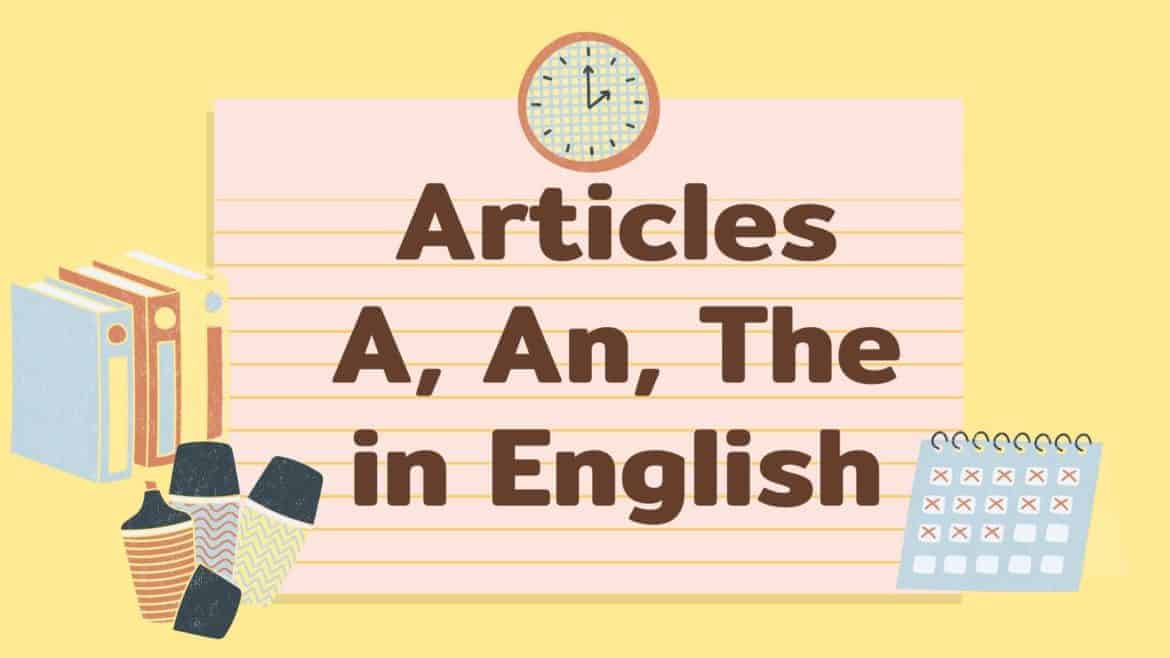How to Use Articles in English? Articles are used to introduce a noun. There are two main types of articles in English. In which, “a, an” is an indefinite article; “the” is a definite article.
⏩ Sign Up to Get Bonus
Here, let's learn how to use these articles with English tivi right now.
You might also like: ALL the English Grammar Basics You Need
How to Use Indefinite Articles “A” and “An”
1. Use “a” or “an” before a singular countable noun. They mean one. They are used in sentences that are general or refer to a subject that has not been mentioned before.
- A ball is round. (General, generic, all balls)
- I saw a boy in the street. (We don't know which boy, not mentioned before)
2. The article “an” is used before words that begin with a vowel sound (in pronunciation, not in writing). Consists of:
- Words that start with the vowels “a, e, i, o”:
Example: an aircraft, an empty glass, an object
- Some words that start with “u”:
Example: an uncle, an umbrella
- Some words that start with a silent “h”:
Example: an heir, half an hour
- Words that begin with an abbreviation:
Example: an S.O.S/ an M.P
3. Use “a” first:
- Words that start with a consonant. These include the rest of the letters and some cases start with “u, y, h“.
Example: a house, a university, a home party, a heavy load, a uniform, a union, a year income, etc.
- Before a noun that begins with “uni…” and “eu”
Example: a university/ a uniform/ universal/ union, Europe, eulogy, euphemism, eucalyptus
- Used in idioms indicating a certain quantity such as: a lot of/a great deal of/a couple of/a dozen of.
- Use before certain numbers, usually thousands, hundreds like: a/one hundred – a/one thousand.
- Use before “half” when it follows a whole unit: a kilo or a half, or when it is combined with another noun to indicate a half (when written with a hyphen): a half – share, a half – holiday.
- Used with fractional units such as: 1/3 (a/one-third), 1/5 (a/one -fifth).
- Used in idioms indicating price, speed, rate: a dollar, a kilometer, an hour, 4 times a day.
You might also like: Modal Verbs: Definition, Usage Examples and Exercises
How to Use the Definite Article “The”
1. Use “the” in front of a noun that has been specifically identified in terms of its properties, characteristics, position, or has been mentioned before, or common, well-known concepts.
- The boy in the corner is my friend.
- The earth is round.
2. With uncountable nouns, use “the” if referring to a specific thing, not “the” if speaking in general.
- Sugar is sweet.
- The sugar on the table is from Cuba.
3. With plural countable nouns, when they mean to represent a class of things of the same type, do not use “the”.
- Oranges are green until they ripen.
- Athletes should follow a well-balanced diet.
4. Some common cases of using “The” according to the above rule:
- The + noun + preposition + noun:
– The girl in blue, the Gulf of Mexico.
- Use before superlative or only comparative adjectives:
– The only way, the best day.
- Used for specified time periods:
– In the 1990s
- The + noun + relative pronoun + subordinate clause:
– The man to whom you have just spoken is the chairman.
- The + singular noun represents a group of animals or things:
– The whale = whales, the deep-freeze
- For “man” when it means “human” absolutely do not use “the”:
– Since man lived on the earth…
- Used before a singular noun to refer to a certain group or class of people in society:
– The small shopkeeper, The top official.
- The + adj: Symbolizes a group of people, they are never allowed in the plural but are considered plural nouns. Therefore, verbs and pronouns that go with them must be in the 3rd person plural:
– The old = The old people (The old are often very hard in their moving)
- The + name of the choir/classical orchestra/popular band:
– The Back Choir/The Philharmonique Philadelphia Orchestra/The Beatles.
- The + names of newspapers (not magazines) / ships / hot air balloons:
– The Times/ The Titanic/ The Hindenberg
- The + family surname in the plural = home family:
– The Smiths = Mr. Smith, Mrs. Smith, and their children
- Usually do not use “the” before a given name unless there are many people or things with the same name and the speaker wants to refer to a particular person among them.
– There are three Sunsan Parkers in the telephone directory. The Sunsan Parker that I know lives on the First Avenue.
- Similarly, do not use “the” before meals: breakfast, lunch, dinner
– We ate breakfast at 8a.m this morning.
- Unless to refer to a specific meal:
– The dinner that you invited me last week was delicious.
- Do not use “the” before some nouns such as: home, bed, church, court, jail, prison, hospital, school, class, college, university etc… when it goes with verbs and prepositions of motion indicating only go there for the main purpose or get out there for the main purpose:
– Students go to school everyday.
– The patient was released from hospital.
- But if going there or leaving is not for the main purpose, use “the”
– Students go to the school for a class party.
– The doctor left the hospital for lunch.
5. The table uses “the” and does not use “the” in some typical cases
| Use “The” | Not Use “The” |
1. Used before names of oceans, rivers, seas, bays and lake clusters (plural) – The Red Sea, the Atlantic Ocean, the Persian Gufl, the Great Lakes 2. Before the name of the mountain range: – The Rocky Mountains 3. Before the names of only objects in the universe or in the world: – The earth, the moon 4. The schools, colleges, universities + of + proper noun – The University of Florida 5. The + ordinal + noun – The third chapter. 6. Before the names of regional wars, provided that the name of the region must be magnetized – The Korean War, The Vietnamese economy 7. Before names of countries with two or more words (except Great Britain) – The United States, The Central African Republic 8. Before the names of countries that are considered an archipelago or an archipelago – The Philippines, The Virgin Islands, The Hawaii 9. Before the names of historical documents or events – The Constitution, The Magna Carta – The Indians – The violin is difficult to play. – Who is that on the piano? | 1. Before the name of a lake – Lake Geneva 2. Before the name of a mountain – Mount Vesuvius 3. Before the names of planets or constellations – Venus, Mars 4. Before these field names if preceded by a proper name – Stetson University 5. Before nouns with a count – Chapter three, Word War One 6. Before the names of countries, there is only one word: – China, France, Venezuela, Vietnam 7. Before names of countries that begin with New, a directional adjective: – New Zealand, North Korean, North Africa 8. Before the names of continents, provinces, states, cities, counties, districts: – Europe, Florida 9. Before the name of any sport – baseball, basketball 10. Before abstract nouns (except for some special cases): – freedom, happiness 11. Before the names of subjects in general – Mathematics 12. Before the names of holidays and New Year – Christmas, Thanksgiving 13. Before the names of musical instruments in specific musical forms (Jazz, Rock, classical music…) – To perform jazz on trumpet and piano |
You might also like: What is a Noun? Nouns in English with Example
Articles A, An, The Exercises
1: ……………….. umbrella.
- A
- An
2: ……………….. European.
- A
- An
3: I read……………….. great book today.
- a
- an
4:……………….. ant is……………….. insect.
- A/ an
- An/ an
- The/ an
- ø
5: The Nile is……………….. river.
- a
- an
- the
- ø
6: Can you tell me how to get to……………….. bank from here?
- a
- an
- the
- ø
7: I can’t believe I failed……………….. yesterday’s test!
- a
- an
- the
- ø
8: ……………….. apple a day keeps……………….. doctor away.
- A / the
- An / the
- The/ a
9: You should evaluate……………….. equipment and make sure fitness machines are modern and in working order.
- a
- an
- the
10: Harold is……………….. most obnoxious person I know.
- the
- an
- a
11: Diana is……………….. very nice person.
- the
- a
- an
12: I’d like to invite him to……………….. dinner next week, if that’s OK with you.
- the
- a
- an
- ø
13: I saw……………….. man going into the office. I don’t know who……………….. man was.
- the/a
- a/the
- a/a
Question 14: The greatest invention of the 20th century is……………….. computer.
- the
- a
- an
15: A volcano has erupted in……………….. Philippines recently.
- a
- the
- an
16: ……………….. city museum is closed today.
- A
- An
- The
- ø
17: I’ve noticed that……………….. Spanish eat a lot of vegetables.
- an
- a
- the
18: When you come out the lift, you’ll see two doors,……………….. red one and
……………….. blue one. My door is……………….. red one.
- the/the/a
- a/a/the
- a/a/a
- the/the/the
19: Could you close……………….. door, please? It’s really cold.
- an
- a
- the
20: She has been playing……………….. flute for ten years.
- a
- an
- the
- ø
Read more: English Grammar
Articles A, An, The Exercises with Answers
1: ……………….. umbrella.
- A
- An
2: ……………….. European.
- A
- An
3: I read……………….. great book today.
- a
- an
4:……………….. ant is……………….. insect.
- A/ an
- An/ an
- The/ an
- ø
5: The Nile is……………….. river.
- a
- an
- the
- ø
6: Can you tell me how to get to……………….. bank from here?
- a
- an
- the
- ø
7: I can’t believe I failed……………….. yesterday’s test!
- a
- an
- the
- ø
8: ……………….. apple a day keeps……………….. doctor away.
- A / the
- An / the
- The/ a
9: You should evaluate……………….. equipment and make sure fitness machines are modern and in working order.
- a
- an
- the
10: Harold is……………….. most obnoxious person I know.
- the
- an
- a
11: Diana is……………….. very nice person.
- the
- a
- an
12: I’d like to invite him to……………….. dinner next week, if that’s OK with you.
- the
- a
- an
- ø
13: I saw……………….. man going into the office. I don’t know who……………….. man was.
- the/a
- a/the
- a/a
Question 14: The greatest invention of the 20th century is……………….. computer.
- the
- a
- an
15: A volcano has erupted in……………….. Philippines recently.
- a
- the
- an
16: ……………….. city museum is closed today.
- A
- An
- The
- ø
17: I’ve noticed that……………….. Spanish eat a lot of vegetables.
- an
- a
- the
18: When you come out the lift, you’ll see two doors,……………….. red one and
……………….. blue one. My door is……………….. red one.
- the/the/a
- a/a/the
- a/a/a
- the/the/the
19: Could you close……………….. door, please? It’s really cold.
- an
- a
- the
20: She has been playing……………….. flute for ten years.
- a
- an
- the
- ø
Download File: Articles A, An, The Exercises PDF



Conclusion
You have learned all about articles in English grammar. Be proactive in doing exercises to get the best results.
Subscribe to the English TV channel on Youtube to improve your English skills!





